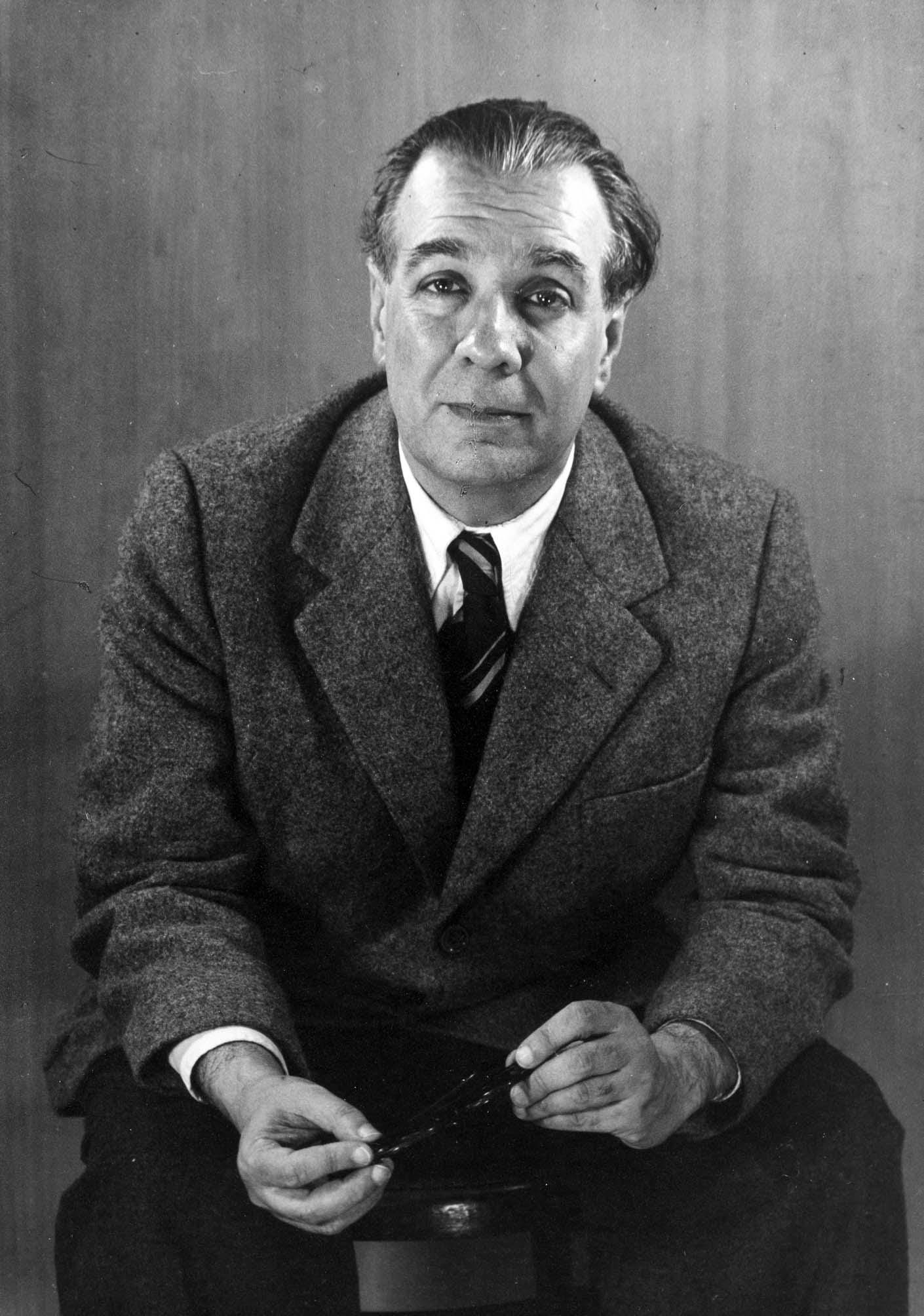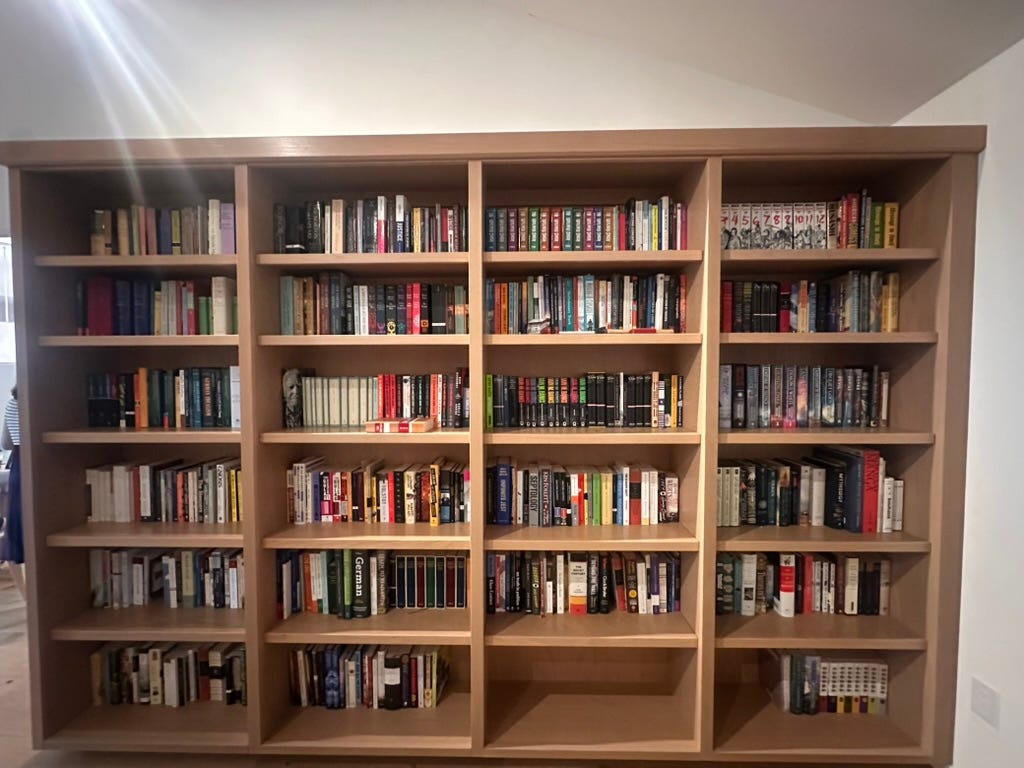The Glimpse of Unknown Territory
On Borges, Bookshelves, a Late Philosopher, and the Wonder of Reading
Two quick pieces of housekeeping before the main post:
Tomorrow (Sunday) 8PM Central is the last Zoom call for Plato’s Republic. This will be our final wrap-up for the book. Links to the calls are sent out to paid subscribers about 30 minutes before the call starts.
I’ve added a new link to the navigation bar of the newsletter: Book Club Archive. Right now, it is just a list of links for each book we’ve read. Eventually, I’ll add details about how the book clubs work, tips for participating, etc. If you’ve wanted to look back at posts about, say, Arendt’s The Human Condition or Marcus Aurelius’ Meditations, then this is the easiest way to find them.
Now, on to today’s entry.
When Alberto Manguel was a teenager in Buenos Aires, he worked in a bookstore. One day, a blind man walked in, accompanied by his mother. After purchasing some books, the man asked Manguel if he would be willing to come to his apartment and read to him. His eyesight had begun deteriorating in middle age, and by 55, he was without sight, making one of his favorite activities, reading, unavailable to him. For a time, his mother read to him in the evenings, but she was elderly and tired easily. So, would Manguel, a teenager with a love of books, be willing to do it?
This is how Manguel met Jorge Louis Borges.
For several years, he made regular visits to Borges’ apartment. Borges would select the books, Manguel would find them on the shelves, and the reading would begin. Sometimes after only a few lines, Borges would take over — reciting Kipling or Shakespeare from memory. Manguel tells us in his A History of Reading that Borges never missed a word, though occasionally he stumbled on the meter.
I turned 35 yesterday. If you were to Google ‘Jared Henderson birthday’, you’ll find my entry on a website called Famous Birthdays. I am not famous, but one day, the Twitter account for the site sent me a message and asked for my birthday. I made up a date: September 3, 1989.
September 3 happens to be the day Gregory the Great became Pope, Oliver Cromwell died and passed on the Commonwealth to his son Richard, Frederick Douglass escaped from slavery, and Qatar became an independent state. I didn’t have anything in mind for the day, though. I didn’t want my real birthday on the website, so I made one up.
I did, however, pick 1989 for a reason. I had been reading Borges and wanted to honor him in some small, sly way, a way I thought he would enjoy. So I made up a false birthday and chose the year he died as my adopted year of birth. I think it would make him smile.
The problem, however, is that Borges died in 1986. I got the year wrong.
The day before my birthday, some carpenters were in my house. They were installing bookshelves I had ordered. We’ve lived in this house for a year and are still making it into a proper home. As part of that, we decided to have shelving built into a long wall in our living room. So I contracted a local company to design and build the shelves.1
Then, I had to decide how to organize them. I had to decide which books went where, which books did not deserve space on the best shelves. In this picture, you can see one of the stages of arrangement. I’ve since moved all the comics and manga to a different area of the house and found other books to take their place.
Borges is on the shelf, as is David Foster Wallace.
I met a writer for The New Yorker recently. More truthfully: a writer from The New Yorker spoke at a small gathering I attended. She and I didn’t exchange many words. She told us her experience of studying with David Foster Wallace at Pomona, a few years before he decided to go off his antidepressants. She spoke highly of him, and she joked about one of her fellow students who, clearly in love with DFW’s writing, included copious footnotes in every story he submitted for the class. I pressed myself closer and closer to the wall I was leaning against as she told this story (with apparent affection) because I know that had I been in that class in California, I would have included even more footnotes.2
It has taken me many hours to arrange the books on the shelves, because I keep wanting to browse through them. I was flipping through DFW, Borges, Calvino — all the sly, winking, weird writers that I’ve been revisiting lately. (Borges is a relatively new addition to the rotation, as I shamefully ignored him for ages, but Calvino is an old favorite.)
As I was reading them, I felt a sense of affection. I love these books, and by extension, I love the men and women who wrote them.
When Manguel would read to Borges, the writer could not stop himself from responding. Books elicited something from him. Sometimes this was a recitation. Sometimes he would, Manguel says, compose a thematic list on the spot. One of these, Manguel says, was an ‘impromptu anthology of bad lines by famous authors,’ such as Hamlet’s cry “O my prophetic soul! My uncle!” (Borges believed ‘uncle’ was an ugly word in this context.)
Keep reading with a 7-day free trial
Subscribe to Commonplace Philosophy to keep reading this post and get 7 days of free access to the full post archives.






